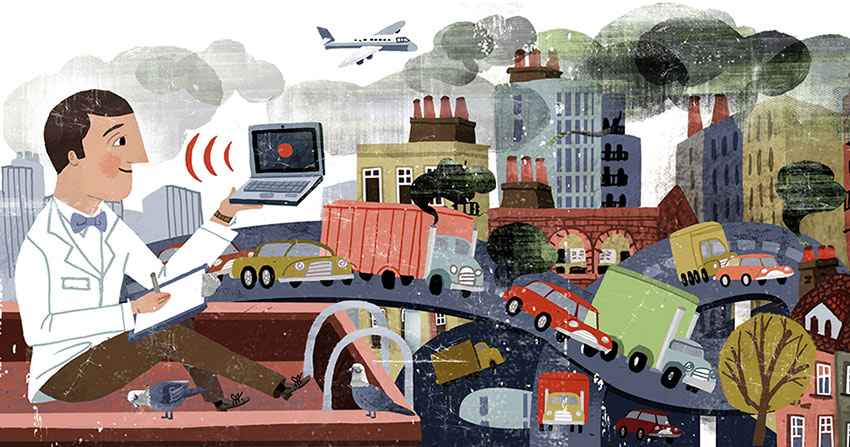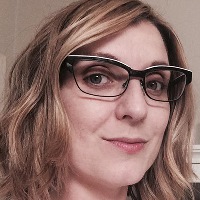1 May 2018
Bringing the Art of Storytelling to the Wonders of Science
By David Washburn

When Tiffany Fox asked Marcos Intaglietta—a world-renowned scientist and a founder of UC San Diego’s bioengineering program—to describe the most challenging aspect of his job, he had a quick and surprising answer: “communication.”
 “He told me communicating with physicians and engineers was extremely difficult because they all have different backgrounds,” said Fox, who is the public information officer for the Qualcomm Institute at UC San Diego. “So here we have one of UC San Diego’s top faculty members saying his greatest challenge is research communication.”
“He told me communicating with physicians and engineers was extremely difficult because they all have different backgrounds,” said Fox, who is the public information officer for the Qualcomm Institute at UC San Diego. “So here we have one of UC San Diego’s top faculty members saying his greatest challenge is research communication.”
Intaglietta’s answer was music to Fox’s ears. Creating better communication about science is not only her passion, but also the foundation of the Science Writing I class she and Heather Buschman, a senior communications manager for UC San Diego Health, are co-teaching for UC San Diego Extension.
Fox and Buschman are an ideal pair for a class that should attract both scientists and writers who don’t know much about science. Fox is a journalist by trade, who jumped from newspapers to science writing just over a decade ago. Buschman, meanwhile, has a Ph.D. in molecular pathology from UC San Diego School of Medicine.
“Two different types of people take this course,” Buschman said. “Those looking to go into science writing as a full-time career, and then scientists who want to be better at communicating what they do for the general public.”
Each group brings talents and perspectives that the other can learn from, as well as bad habits that need to be broken, say Fox and Buschman.
How to get scientists to say less and writers to understand (and write) more
 Buschman says the hardest thing to teach a scientist about writing is how to say the same thing, but in many fewer words. Scientists also forget that scientific terms aren’t household words.
Buschman says the hardest thing to teach a scientist about writing is how to say the same thing, but in many fewer words. Scientists also forget that scientific terms aren’t household words.
“I often have to remind scientists that we don’t need to include every single piece of information,” Buschman said. “They tend to focus on getting their points across to their peers and forget who the audience is.”
Fox calls it the “curse of knowledge…they forget that their audience only knows a fraction of what they know about their subject,” she said. Another issue scientists have, Fox says, is “defensive communication,” or the tendency to use big words and list their credentials in a defensive way.
Finally, both say scientists need to learn how to get beyond the hard facts and tell the stories behind their work.
“There is a lack of emotional contrast—a lot of facts, but very little emotion,” Fox said. “More and more there has been an effort to get more storytelling in hardcore research conferences. The push is coming from both people who are professional communicators as well as from inside academia, especially with the anti-science climate we have right now nationally. Stories help people understand facts that can be difficult to understand otherwise.”
On the flip side, Fox and Buschman say journalists often go to the opposite extreme as scientists— including too few details and not properly quantifying the results of research.
“The writer without a scientific background tends to speak in absolutes…saying things like ‘researchers proved’ or ‘cured’ when those are not the results of the research,” Buschman said. “That is a disservice to both the science and the audience—they need to learn to use language that is more accurate and less hyped.”
News quiz, open mic and LOL My Thesis
2018 was the first year that the science writing class wasn’t taught by Lynne Friedmann (she’s teaching higher-level courses). Fox and Buschman, who both took Friedmann’s class, want to carry on some of her traditions while also adding their own twists.
That means the weekly science news quiz that was a staple of Friedmann’s class will remain. But new additions will include “open mic” sessions during which students will have the opportunity to read their writing aloud and get feedback from the class. Another will be an assignment called “LOL My Thesis,” which will challenge students to re-write their thesis in a way that is more accessible to the average reader.
“Everybody is born with an innate sense of wonder about how the world works,” Buschman said. “And we want to help make sure people in science communication continue to foster that by sharing stories about science in an accurate and meaningful way.”
Did you find this article helpful or interesting? Let us know in the comments.